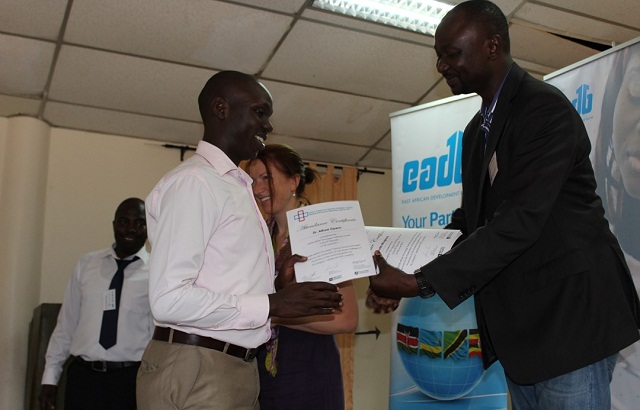
Cancer fight: East African Development Bank targets 600 medics in four years
Kampala, Uganda | JULIUS BUSINGE | The East African Development Bank in partnership with the British Council and the Royal College of Physicians has intensified the fight against cancer in the East African region by training medical professions.
According to the bank’s officials, 600 medical professionals will be equipped with skills to manage the scourge in the next four years across East Africa. Available statistics indicates that more than 60% of cancer deaths occur in developing countries.
Experts have welcomed efforts geared towards skilling personnel to manage the disease globally. From June 20 to 22, medics (23) were trained in Soroti, Eastern Uganda as part of this programme. Similar trainings have previously taken place at St. Francis Hospital, Nsambya and at the Uganda Cancer Institute, Mulago in 2016. Others have been conducted in Kenya and Tanzania.
The programme is focusing on early detection, research and treatment of cancer and neurological disorders especially in communities where access to qualified professionals remains a challenge.
Vivienne Yeda, the director general of EADB said the bank is committed to the cause and are receiving positive feedback from the doctors who have so far taken part in the trainings.
“Our core objective is to upgrade the ability of the target group of physicians to be able to better manage the patients with common neurological disorders,” Yeda said.
The programme comes at the time the region is recording an increase in the number of cancer patients with close to 80% of the victims getting to know about their cancer status late. This makes it hard for doctors to manage.
Dr. Abrahams Omoding, a specialist medical oncologist with the Uganda Cancer Institute and also one of the programme trainers says that cancer now kills more people than HIV/AIDS, malaria and tuberculosis combined.
Although the signs and symptoms of the disease are still not well-known in many communities, there have been tremendous efforts to sensitise people and train medical practitioners in early identification of cancer cases, professions in this field say.
As part of the success story, Dr. Jacinta Abarau Ojia, who is part of the trainees, was able to detect cancer in her uncle’s body at an early stage and took necessary steps to tame the silent killer disease. This success story is what majority of the cancer patients are would want to tell amidst support of entities like the EADB.
The causes and prevention measures
Medical experts say the causes of cancer are not known but there are common signs and symptoms including recurrent fevers, weight loss and fatigue. Experts in this field say that by avoiding tobacco smoking, excessive alcohol consumption and poor or non-regulated feeding habits and exposure to radiation and chemicals would increase chances of averting cancer.
Globally, according to the World Health Organisation (WHO), there will be 13.2 million cancer-related deaths every year by 2030.
 The Independent Uganda: You get the Truth we Pay the Price
The Independent Uganda: You get the Truth we Pay the Price



